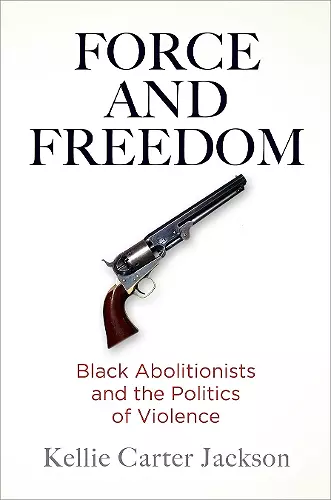Force and Freedom
Black Abolitionists and the Politics of Violence
Format:Hardback
Publisher:University of Pennsylvania Press
Published:22nd Mar '19
Currently unavailable, and unfortunately no date known when it will be back
This hardback is available in another edition too:
- Paperback£23.99(9780812224702)

In Force and Freedom, Kellie Carter Jackson provides the first historical analysis exclusively focused on the tactical use of violence among antebellum black activists. Through tactical violence, argues Carter Jackson, abolitionist leaders created the conditions that necessitated the Civil War.
From its origins in the 1750s, the white-led American abolitionist movement adhered to principles of "moral suasion" and nonviolent resistance as both religious tenet and political strategy. But by the 1850s, the population of enslaved Americans had increased exponentially, and such legislative efforts as the Fugitive Slave Act and the Supreme Court's 1857 ruling in the Dred Scott case effectively voided any rights black Americans held as enslaved or free people. As conditions deteriorated for African Americans, black abolitionist leaders embraced violence as the only means of shocking Northerners out of their apathy and instigating an antislavery war.
In Force and Freedom, Kellie Carter Jackson provides the first historical analysis exclusively focused on the tactical use of violence among antebellum black activists. Through rousing public speeches, the bourgeoning black press, and the formation of militia groups, black abolitionist leaders mobilized their communities, compelled national action, and drew international attention. Drawing on the precedent and pathos of the American and Haitian Revolutions, African American abolitionists used violence as a political language and a means of provoking social change. Through tactical violence, argues Carter Jackson, black abolitionist leaders accomplished what white nonviolent abolitionists could not: creating the conditions that necessitated the Civil War. Force and Freedom takes readers beyond the honorable politics of moral suasion and the romanticism of the Underground Railroad and into an exploration of the agonizing decisions, strategies, and actions of the black abolitionists who, though lacking an official political voice, were nevertheless responsible for instigating monumental social and political change.
"Force and Freedom provides a compelling intervention in studies of slavery, abolitionism, and allyship. Though many Americans envision abolitionism as a movement led by pacifistic white ministers, Carter Jackson's work overturns this limited conception of antislavery resistance. By centering black voices in this antebellum campaign, the author unveils the philosophical complexities that permeated the abolitionist movement." * The Journal of African American History *
"Carter Jackson traces the role of violence in the black abolitionist movement from the beginning of the nineteenth century through the Civil War to illustrate that...black abolitionists realized all along that true freedom—emancipation coupled with equality—would require the use of self-defense and political violence..[A]nc acessible and engaging discussion of the story of violent resistance in the movement and a valuable analysis of its historical meaning and implications for the current day." * H-Nationalism *
"Carter Jackson contributes the importance of political violence to our understanding of Black-led abolitionism and explains how Black abolitionists reclaimed and repurposed the Revolutionary idea of forcing freedom...With Force and Freedom, Carter Jackson makes a stimulating and insightful debut which will have a major influence on abolition movement scholarship. She recenters Black leadership in the movement and illuminates how critical it was to cementing violence as the only real solution to slavery and Black emancipation." * The New England Journal of History *
"With engaging new sources and a deft reading of familiar narratives, Kellie Carter Jackson reminds us that black resistance was always central to abolition. Force and Freedom centers the role of violence in the long road to black freedom, rendering a more complicated image of black abolitionists who were willing to abandon the petition for the gun. A most important contribution to the study of American abolition." * Erica Armstrong Dunbar, author of Never Caught: The Washingtons' Relentless Pursuit of Their Runaway Slave, Ona Judge *
"In this original and important contribution to the history of abolitionism, Kellie Carter Jackson draws on newspapers, pamphlets, speeches, and convention proceedings to trace how black abolitionists abandoned Garrisonian 'moral suasion' and increasingly called for violent resistance to slavery. As she demonstrates, violence was both a political language and a concrete strategy, a means of galvanizing support in the North, drawing attention to the violence inherent in slavery, preventing the rendition of fugitive slaves, and paying tribute to the revolution that had overthrown the slave system in Haiti." * Eric Foner, author of Gateway to Freedom: The Hidden History of the Underground Railroad *
"Kellie Carter Jackson reveals that revolutionary violence was a valuable weapon in the abolitionist arsenal, especially among African Americans. Black abolitionists, this book documents eloquently, were waging a war against slavery long before the booming of guns during the Civil War." * Manisha Sinha, author of The Slave's Cause: A History of Abolition *
- Winner of Awarded the James H. Broussard Best First Book Prize, granted by the Society for Historians of the Early American Republic (SHEAR) 2021
- Winner of Winner of the James H. Broussard Best First Book Prize, granted by the Society for Historians of the Early American Republic 2021
- Short-listed for Chosen as a finalist for the Museum of African American History's Stone Book Award 2021
- Short-listed for Selected as a finalist for the 2020 Frederick Douglass Book Prize, granted by The Gilder Lehrman Center for the Study of Slavery, Resistance, and Abolition at Yale University 2021
ISBN: 9780812251159
Dimensions: unknown
Weight: unknown
224 pages